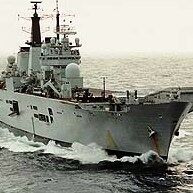
Death of the British Navy
Britain’s Royal Navy, once a pillar of Britain’s global power and the most formidable fleet in the world, is being gutted, with almost half of its warships slated to be mothballed.
Even as nations such as China and even France are strengthening their naval forces—recognizing that in a world of increasingly scarce resources and growing instability, they who control the seaways will have an advantage in any future conflicts—the very nation that once did rule the seas, Britain, is downsizing its navy.
Earlier this month the government revealed that 13 of the fleet’s 44 warships are already in a state of reduced readiness. A further six vessels will possibly be cut, leaving just 25 warships. The Navy is expected to lose one of its three aircraft carriers, and, furthermore, there is concern among naval officers that two new carriers, promised almost a decade ago, might never be built. In addition, the Telegraph reports that one of Britain’s three major ports is under threat of closure.
“What this means is that we are now no better than a coastal defense force or a fleet of dug-out canoes,” a senior officer currently serving with the British Fleet in Portsmouth said. “The Dutch now have a better navy than us.”
London’s Telegraph of January 5 commented:
Our status in the world, as well as the security of these islands, depends chiefly on sea power. For the better part of 500 years, England and then Britain inflicted crushing defeats on larger, wealthier and more populous nations because it controlled the main. For much of that period, indeed, foreign vessels had to dip their colors when passing our ships, in acknowledgement of our sovereignty of the seas. That chapter is to be closed.
Yesterday, in the title of an article for London’s Mail on Sunday, Peter Hitchens wrote: “My father served in the Navy when it was our pride and power—and the envy of the world. So why have we thrown it all away?” He went on to reflect:
The Royal Navy is as good as finished. Almost without a fuss, the great traditions of centuries are quietly coming to an end. A service that once took British power to all the corners of the Earth is now shrunk to a pathetic remnant, largely stuck in harbor for lack of fuel and money.
Go to what was once the world’s premier naval station to see for yourself. From the top of Portsdown Hill the view, while captivating, is melancholy and dispiriting too. My old Edwardian encyclopedia describes Portsmouth as the most strongly fortified city in the Kingdom, and the home to a great fleet of warships unmatched in the world. Look at it now, denuded and empty. In the muddy creek at the top of the harbor you can make out the hulks of mothballed destroyers and frigates.
The Telegraph reports, “Defense sources said it would be unlikely that the Navy could now launch an armada of the kind that retook the Falkland Islands in 1982” (op. cit.).
Ironically, the diminution of Britain’s navy proceeds apace even as the world is getting increasingly dangerous, with terrorism and piracy on the seas becoming a greater threat. Rather than stepping up operations or capabilities, however, the Ministry of Defense has said the Navy may possibly have to abandon one of its major commitments around the world.
This is not only a sad reminder of the slide from global relevance that Great Britain is experiencing, but also a demonstration of the great global power transfer underway.
Read Herbert W. Armstrong’s The United States and Britain in Prophecy to see how this reality fits with biblical prophecies made thousands of years ago and why it is happening at this time.
